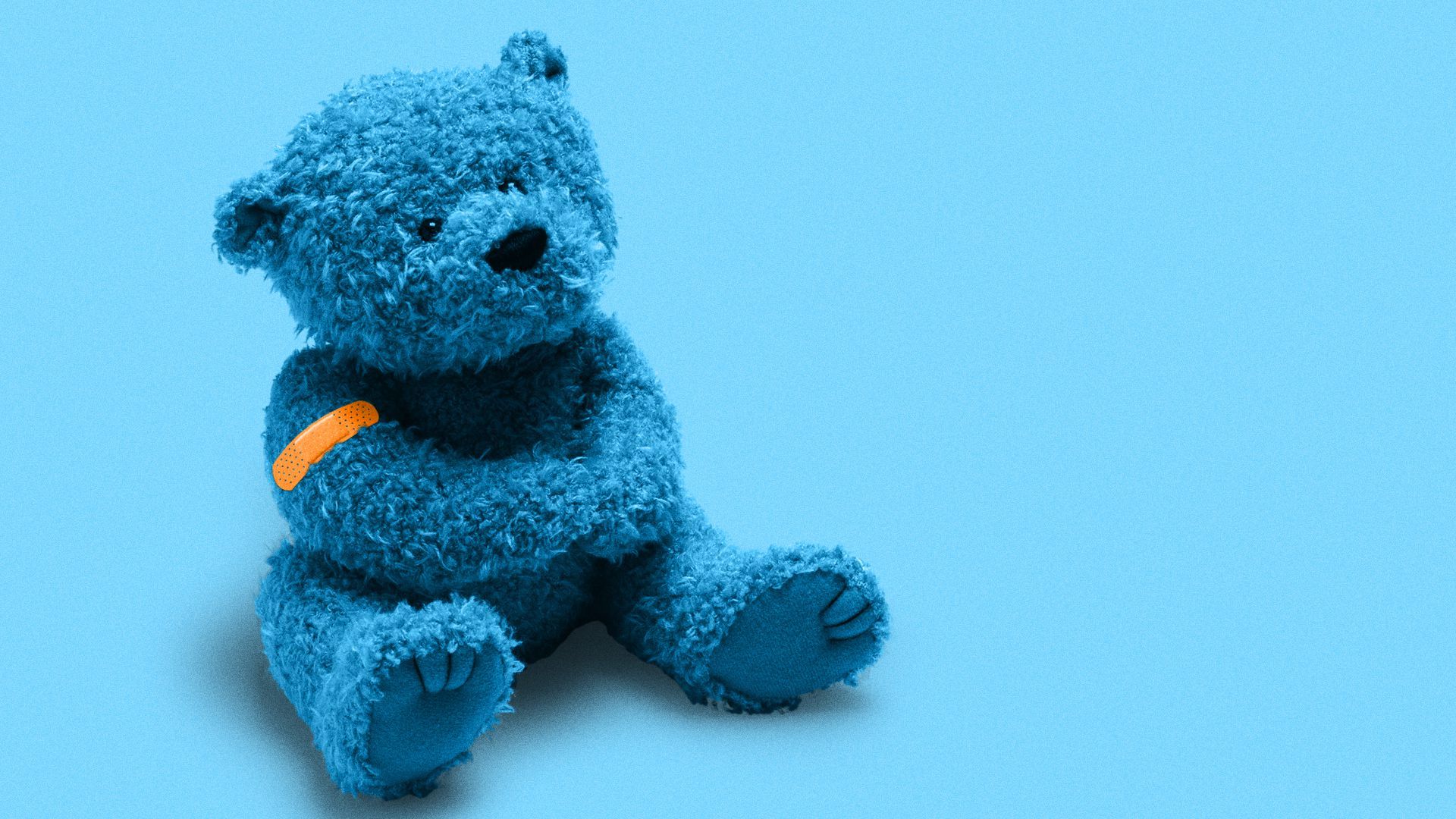
Illustration: Maura Losch/Axios
As federal health officials debate the logistics of administering fourth coronavirus vaccines to some older Americans, children under five years old remain ineligible for any shots — and it's unclear when that will change.
The big picture: Less-than-ideal clinical trial results and growing backlash against children's vaccinations writ large have complicated what was already a delicate decision-making process.
Why it matters: Young children generally aren't at high risk of severe COVID infections, but some do get seriously ill or, in rare instances, die. Plenty of parents remain anxious to vaccinate their children as soon as possible.
- At the same time, vaccine hesitancy is high among parents of young children, and only 27% of children ages 5 to 11 — the most recent age group to become eligible for vaccines — have been fully vaccinated, according to the American Academy of Pediatrics.
- Moving quickly to authorize the shots for young children carries risks for regulators because dosing recommendations could still change, undermining vaccine confidence. But moving with extra caution further delays long-awaited protection against the virus for this youngest age group.
What they're saying: “We at FDA really understand the urgency that people feel about wanting to get the youngest children vaccinated. We also understand that this is the age range when people are most concerned about potential side effects and the potential safety of vaccines," top FDA vaccine official Peter Marks recently told reporters.
- "We know that in this population, we have to do our job extremely well to make sure that we ensure that there is very good evaluation of the safety and effectiveness, so that when we make our recommendation, people will trust that recommendation," he added.
Between the lines: Federal officials and drugmakers' efforts to authorize coronavirus vaccines for young children are running up against the same problem every other age group is having: Two doses don't work very well at preventing infections with the Omicron variant. And additional shots are out of the question until more data comes in.
- Pfizer announced in December that two doses of its vaccine had only met the FDA-established threshold for authorization in a subset of young children and that it's testing a third dose.
- The company, at the FDA's request, had asked for authorization of two doses while waiting for the data on a third, but walked back that plan after data revealed two shots offer limited protection against Omicron.
But Moderna recently announced that its two-dose, reduced-size vaccine for children six months to under 6 years old did meet the FDA threshold of eliciting the same antibody response as the standard dose does in young adults.
- However, two doses of Moderna was only 44% effective against Omicron infections for children six months to two years old and 38% effective for children between two and six years old, which is lower than the threshold the FDA had set for adult vaccine authorizations.
- The company wasn't able to assess effectiveness against severe disease, but it's likely higher, as is the case with adults.
The catch: Two doses of either Pfizer or Moderna's vaccine don't offer much protection against Omicron for anyone. But while adults can remedy this with a third or even fourth shot, the low effectiveness keeps young children from getting any doses.
- It's not just a regulatory dilemma. Low efficacy could also even further dampen public demand for the vaccine, especially without more thorough data.
- "If you're a pediatrician trying to convince a parent to vaccinate [their] kid, you don’t have much artillery there. You have 30-40% effectiveness against infection" and no data on serious disease, said Peter Hotez, co-director of the Texas Children's Hospital Center for Vaccine Development. “I think from an advocacy perspective, that’s a tough sell.”
What we're watching: Moderna said last month that it would request FDA authorization for its two-dose vaccine "in the coming weeks," but CEO Stephane Bancel told Yahoo Finance that the vaccine likely won't be available for "a couple of months...not a couple of weeks."
- Pfizer expects data on the effect of a third shot in young children this month. Moderna is also testing a booster shot for kids.
The bottom line: “The other policy consideration is that the pediatric vaccine ecosystem is so fragile right now because of the anti-vaccine movement," Hotez said.
- "I think there’s some risk aversion there of disrupting confidence in our whole vaccine system for kids."
